Latest articles
12.11.2020
“A guide to teacher competences for languages in education”: New resource website for teacher educators and designers of teacher education programmes
The European Centre for Modern Languages (ECML) of the Council of Europe is pleased to announce the completion in both English and French of its resource website “A guide to teacher competences for languages in education” (www.ecml.at/guidetoteachercompetences), an output of the ECML programme “Languages at the heart of learning” (2016-2019).
This comprehensive resource platform has been developed for teacher educators and those responsible for teacher education programmes. It provides an overview of frameworks and descriptions of language teacher competences in various contexts, as well as national and regional standards or guidelines for all teachers working in public education. Having considered the overview, users can then examine more closely those frameworks that are potentially useful to them in their specific roles.
A key focus is also to raise users’ awareness of the ways in which initial and in-service teacher education and the resources developed to support it, contribute to the fundamental aims and values of the Council of Europe – i.e. ensuring quality education for all for effective participation in democratic, social cohesive and inclusive societies. These aims and values are more important than ever, with Covid-19 creating further social and linguistic divides.
“A guide to teacher competences for languages in education”
(www.ecml.at/guidetoteachercompetences)
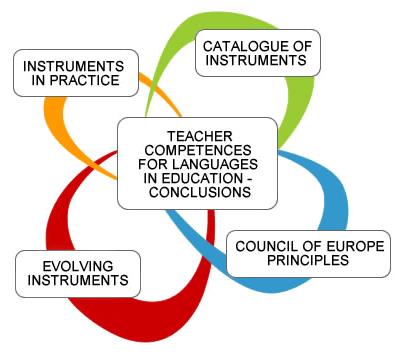
Click on the links below to go directly to the different resources:
03.06.2019
Describing teacher competences for language education
In the last six months, the team members of the Towards a Common European Framework for Language Teachers project have been engaged in an intensive final round of review and consultation.
The online Guide to instruments and frameworks describing teacher competences for language education will be finalised in English by early summer, with a French version to follow soon after. The analysis of forty competence frameworks has inspired the team to propose a model of teacher competences which, while related to learners’ language and intercultural competences, are common to all teachers.
This novel perspective received support from the 160 respondents to an international online survey conducted in early 2019. The responses indicated a high level of approval for potential future instruments suitable for use by, but are not restricted to, teachers of foreign languages. In a bilingual webinar in February, we explained our rationale for such a common approach, which we believe would contribute, for instance, to greater coherence in teacher education curricula, and improved cooperation between teachers of different subjects, especially as regards language(s) in education.
The rationale for such an approach, as well as detailed recommendations on the target groups for and uses of future instruments, have been summarised in a brief report on the need for and feasibility of further common instruments. After review and translation, this report and the draft model of teacher competences will also be published on the project website.
The project team: Lukas Bleichenbacher (coordinator), Michel Candelier,
Francis Goullier, Richard Rossner, Anna Schröder-Sura
01.03.2019
Towards a common resource for language-related teacher competences? webinar
The “Towards a common resource for language-related teacher competences?” webinar on Wednesday 27 February 2019 presented the preliminary results of the ECML project, Towards a Common European Framework of Reference for Language Teachers .
In the webinar, the coordinator Lukas Bleichenbacher and the project team presented their approach to some of the project’s key questions:
- What need is there for a future resource that describes the competences of language teachers and the language-related competences necessary for teaching other subjects?
- Is it feasible to propose a model with common competences for all teachers, and specific adaptations for different kinds of teachers?
- In what ways could the development of such a resource be of concrete value for teacher education and professional development?
The webinar also provides a practical introduction to the online guide to the many existing instruments available that describe teacher competences.
Link to recording of the webinar: www.ecml.at/CEFRlanguageteachers
If you are interested in the work of the project, you are also invited to complete a short online survey at the following address at https://ww2.unipark.de/uc/IFDS/41c5/
11.02.2019
Take part in the webinar “Towards a common resource for language-related teacher competences?”, Wednesday 27 February, 16:00-17:30 (CET)
Target audience: teacher educators / trainers, teachers (languages and other subjects), policy makers, curriculum designers, employers of teachers.
Languages: the webinar will be held in English and French.
Registration: link
Description
This webinar will present the preliminary results of the project Towards a Common European Framework of Reference for Language Teachers (a project of the European Centre of Modern Languages): www.ecml.at/CEFRlanguageteachers.
In the webinar, the coordinator Lukas Bleichenbacher and the project team will present their approach to the project’s key questions, including the following:
- What need is there for a future resource that describes the competences of language teachers and the language-related competences necessary for teaching other subjects?
- Is it feasible to propose a model with common competences for all teachers, and specific adaptations for different kinds of teachers?
- In what ways could the development of such a resource be of concrete value for teacher education and professional development?
In the webinar, participants will also be introduced to the online guide to many existing instruments that describe teacher competences. The project team will be happy to react directly to participants’ comments and questions.
*****
Those intending to participate in the webinar and others who are interested in the work of the project are also invited to complete a short online survey on the questions that will be discussed, which is available at https://ww2.unipark.de/uc/IFDS/41c5/
04.02.2019
Participate in the online survey on the need for future resources about language-related teacher competences. Deadline: 26 February 2019!
The project team has already developed a catalogue of existing instruments and publications which describe different dimensions of language-related teacher competences in these areas across different levels of education (e.g. primary, secondary or tertiary education). Further information about the project can be found here.
Now they wish to explore the need for, and the potential benefits of a future overarching reference resource focusing on the teacher competences needed for the effective use and development of language in various types of teaching. What main uses should such a future resource serve, what should it contain and what other characteristics should it have? These are the main questions covered in this short survey.
The project team invites all interested parties to participate in this online survey. They are asking you to think about the current specific needs in your professional context, but also to consider what developments could be useful in the future for a wide range of teacher educators and teacher.
If you prefer to discuss the questions with one or more colleagues and provide responses that represent the opinions of both/all of you, please indicate this at the end of the survey.
Please pass on the link to anyone you think might contribute.
Deadline of the survey: 26 February 2019.
Lukas Bleichenbacher, Richard Rossner, Anna Schröder-Sura, Michel Candelier, Francis Goullier
(project team)
31.10.2018
ECML project “Towards a Common European Framework of Reference for language teachers”: workshop results (Graz, Austria, 3-4 October 2018)
A total of 39 participants, including delegates from ECML member states, associate partners, and other guests, joined the project team for the two-day workshop of the project Towards a Common European Framework for Language Teachers. The participants, who were employees of language schools, institutions running teacher education programmes, and ministries of education, discussed current challenges in teacher education and professional development in their contexts and others.
The useful discussion of the draft online Guide to instruments and frameworks describing teacher competences for language education will help finalise the website. Valuable feedback was also received on a draft Overview of the language-related competences of different kinds of teachers. This Overview, which may form the basis of a future framework or other instruments for use by educators, teachers, and other stakeholders, contains competence descriptions in the areas of pedagogy, language competences, guiding principles of language education, but also for dimensions such as cooperation with other stakeholders, and teachers’ career-long learning.
The participants’ active contributions and their critical feedback on the products and aims of the project will enable the team to provide a qualified opinion on the need for a future framework before the end of the project in 2019.
The ECML project team:
Lukas Bleichenbacher (project coordinator), Francis Goullier, Anna Schröder-Sura, Richard Rossner
- Project website "Towards a Common European Framework of Reference for language teachers" (2016-2019): English - French
04.10.2018
ECML workshop “Towards a Common European Framework of Reference for language teachers” (Graz, Austria, 3-4 October 2018)
Language professionals from 33 European countries are discussing the project’s user guide to teacher competence instruments with practice examples and a draft inventory for language teacher competences in their own professional contexts as language teacher educators, curriculum designers, directors of studies, staff responsible for professional development or language teachers and subject teachers with a background in language-sensitive subject teaching.
This is a unique opportunity for the 47 participants to influence plans for a possible future Common European Framework for language teachers and for the role of language in education, and to share views on the future of their profession.
More information on the project: www.ecml.at/teachercompetences
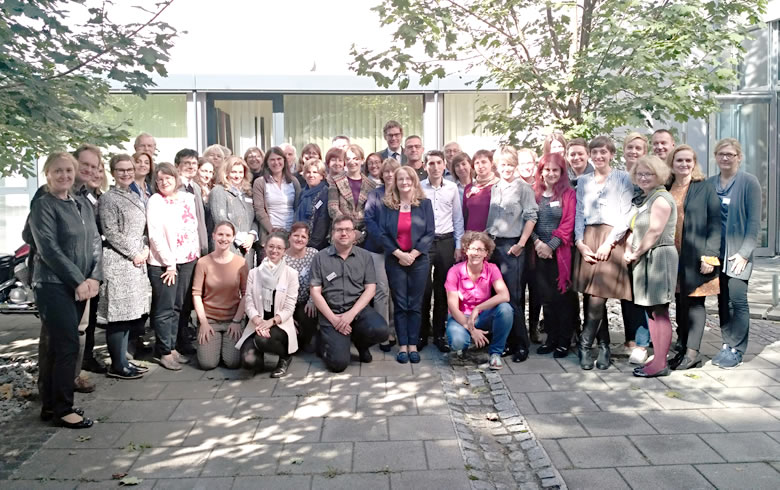
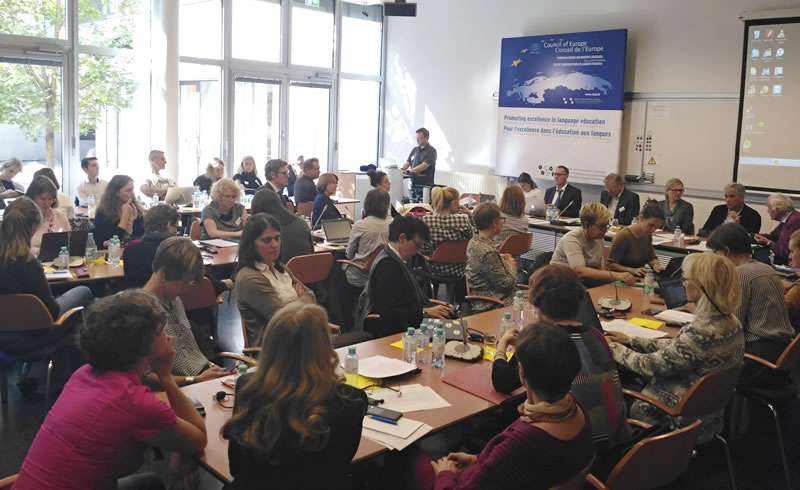
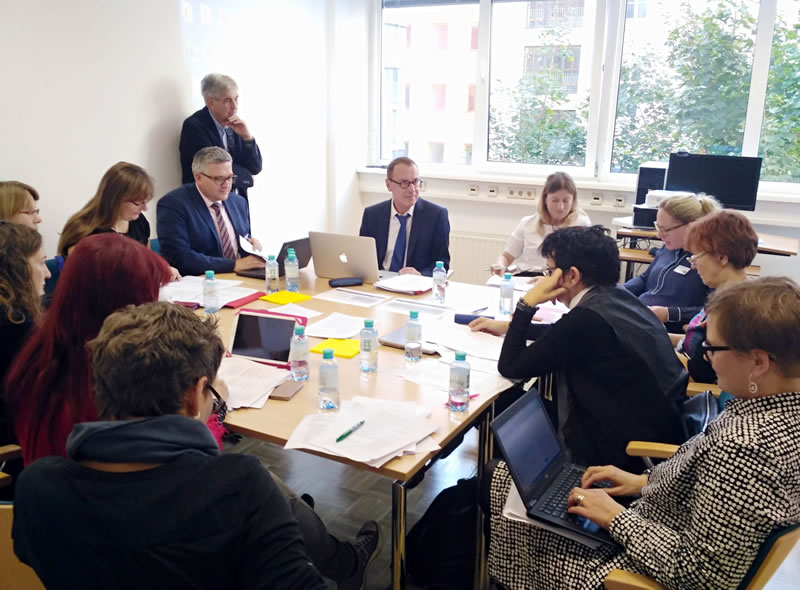
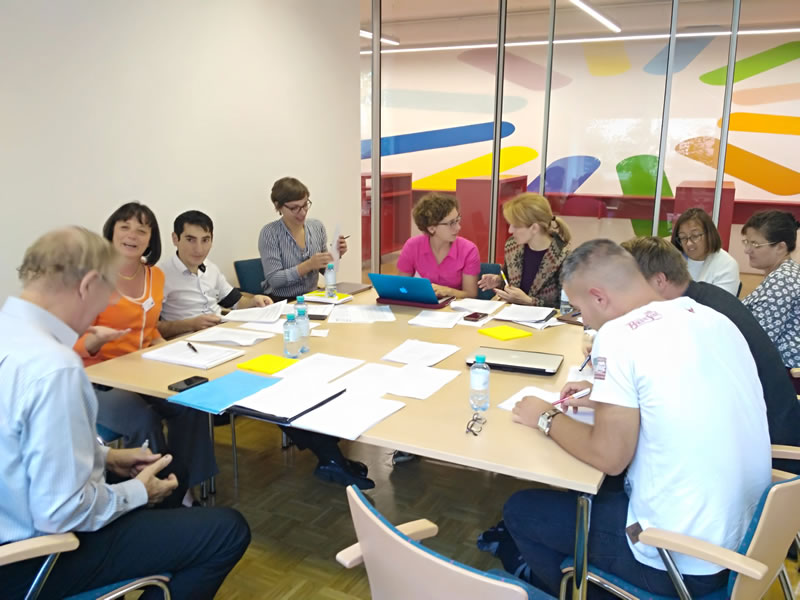
13.06.2018
Just published : Courriel européen des langues – Issue no. 40, the e-magazine of the National Contact point for the ECML in France
The “Courriel européen des langues”, the online magazine which is edited twice a year by the International Centre for Pedagogical Studies (CIEP), has been relaunched with renewed contents and a refreshing layout. The current issue highlights 6 ongoing ECML projects, giving the floor to the project coordinators and a project team member, as well as to teachers in the field. In addition, the National Contact Point for the ECML highlights the new national language strategy in Denmark. Finally, a section presents 11 recent resources (online materials, publications).
The Courriel is disseminated in French on the CIEP website and on its LISEO portal (see dedicated section “Courriel européen des langues”). You can subscribe for free to the Magazine and find the archives here: http://www.ciep.fr/lettres-information/courriel-europeen-langues.
Contents of Issue no. 40 – May 2018 (only available in French):
Focus sur le projet EOL
- EOL – Des environnements d’apprentissage optimisés pour et par les langues
Article de Jonas ERIN, Inspecteur général de l’éducation nationale, coordinateur européen du projet EOL
- Témoignages
- Le projet EOL au collège André Chénier (Carcassonne)
Témoignage d’Émilie Courtejaire, avec la collaboration de Selvi Gras, professeur d’anglais et professeur d’espagnol au collège André Chénier, coordinatrice du projet EOL pour le collège
- Le projet EOL au lycée Les 7 Mares (Maurepas)
Témoignage de Noëlle Sédilot-Gasmi, Professeure d’espagnole et coordinatrice de la discipline, initiatrice et coordinatrice du projet EOL pour le lycée
Autres projets du CELV
- Le projet e-lang - Vers une littératie numérique pour l’enseignement et l’apprentissage des langues
Article de Christian Ollivier, Professeur des universités à l’université de La Réunion, coordinateur du projet e-lang
- La/les langue(s) de scolarisation : une feuille de route pour les établissements scolaires
Article de Rebecca DAHM, Maître de conférences en didactique des langues, ESPE Midi-Pyrénées – Université Toulouse-Jean Jaurès, coordinatrice du projet Langue(s) de scolarisation
- Le projet QualiMatrix dans sa dernière année de développement
Article de Gudrun ERICKSON, University of Gothenburg, Department of Education and Special Education, documentaliste du projet QualiMatrix
Actualités
- Développer la conscience linguistique dans les matières scolaires : appel à contribution pour les enseignants de DNL
- Vers un Cadre européen commun de référence pour les enseignants de langues : trois instruments à l’honneur en 2018
- La Gazette européenne des langues
L’enseignement des langues au Danemark
- Entretien avec Ana Kanareva-Dimitrovska, point de contact national du Danemark
Propos recueillis par Marion Latour et Bernadette Plumelle
Ressources
- À explorer sur internet
- Label européen des langues : EUROBAC
- Écrire en plusieurs langues : dossier réactualisé « Intégrer le numérique en classes de langues »
- Dossier thématique « La mémorisation : Dans quelle mesure le numérique permet-il de créer des situations d’apprentissage efficace ? »
- Audio Lingua : 5 000 fichiers audio en 13 langues
- Radio Garden : écouter en direct toutes les radios nationales, locales ou web du monde
- 7 nouveaux kits eTwinning pour monter un projet eTwinning
- Vient de paraître
30.04.2018
Regional workshop "Towards a Common European Framework of Reference for language teachers" (Bucharest, Romania, 22-23 March 2018)
In March 2018, the Bucharest University of Economic studies (www.ase.ro) served as a venue for a regional project workshop. Prof. Laura-Mihaela Muresan, who has been a member of the project network since 2016, invited over forty teacher educators, teachers, educational managers and students to the two-day event. The specializations of the experts from Romania, Bulgaria, Moldova, Poland ranged from languages for specific purposes (e.g. Business English and French) to the teaching of Romanian as a foreign language.
For the project team, the event was an opportunity to learn about current priorities and challenges for language educators in Central and Eastern Europe, and to gather feedback and insights on the project work in progress.
The experts scrutinized the draft online Guide to teacher competence instruments, which is accessible here, and gave valuable feedback on a first draft inventory of teacher competences. The discussions resulted in many inspiring ideas and concrete suggestions to make the website and the other project outputs attractive and lively, but also innovative in terms of content, ambitious in its aims, and solid in its ambition to provide maximal support for different kinds of teachers and their learners.
- Project website "Towards a Common European Framework of Reference for language teachers" (2016-2019): English - French
The ECML project team:
Lukas Bleichenbacher (project coordinator), Francis Goullier, Anna Schröder-Sura, Richard Rossner
12.02.2018
Intense and fruitful exchange of ideas on future developments in language education
The 2-day meeting (6-7 February 2018) at the ECML in Graz, Austria, was an excellent opportunity for the ECML project experts to discuss ongoing project developments with their fellow project coordinators.
They explored synergies between the different projects and exchanged good practice in project methodology. They discussed ongoing work on the development of their products and how to best disseminate the wide range of final results which will be achieved by the end of 2018 and 2019. They reflected on critical success factors to promote the achievements across and at the end of their respective project life cycles, to implement, to mediate, to possibly further develop them and to maximise impact in the various national and individual contexts. Finally they shared initial ideas for both the contents and the structure of the next ECML programme (2020-2023). They also highlighted the added value, both professional and personal, of coordinating ECML projects, seeing this as an opportunity to bridge policy, research and practice and contribute to making a real difference to quality language education in Europe.
Impressions of the meeting (photo gallery on Facebook)
Current ECML programme of activities 2016-2019: "Languages at the heart of learning"
01.02.2018
"Towards a Common European Framework of Reference for language teachers" (CEFRLT): project update - January 2018
One of several aims of the project "Towards a Common European Framework for Language Teachers" is the piloting and further development of existing instruments. In 2018, there are important news for three instruments:
A new website profils-langues.ch has been launched for foreign language teachers and student teachers to self-assess their language competences in the target language. The website also contains model tasks for formative assessment by teacher educators, based on the Profession-related Language Competence Profiles (available in English, French, German and Italian here). In 2018, further insights from the piloting activities will feed into the CEFRLT project at the ECML.
Work is continuing on a parallel version of the existing Eaquals Framework for Language Teacher Training and Development that is aimed specifically at teachers of languages for academic purposes working on courses intended for students in higher education. The aim is to raise the awareness of teachers and others with different levels of experience in this sector concerning the specific areas of knowledge and skill required for this kind of language teaching. A validation exercise will be undertaken in 2018.
The overall structure of the future "Framework of reference for the training of teachers in the use of pluralistic approaches" has been stabilized (ethical and political dimension, linguistic and cultural competences, methodological competences) after discussions and exchanges at presentations. It should now be subject to only a few adjustments. The framework is based on the Framework of reference for pluralistic approaches to languages and cultures (FREPA) and the Skills Reference Data in Didactics of the Intercomprehension (REFDIC). In 2018, efforts will focus on the internal structure of each dimension, and on the declination of skills in savoirs, savoir-être and savoir-faire.
05.10.2017
Towards a Common European Framework for Language Teachers: latest ECML project news
How can teachers, teacher educators and other stakeholders in language education be informed about the wealth of existing instruments that describe language-related teacher competences? How are these instruments used in practice by teachers, teacher educators and curriculum planners? These questions lay at the heart of two intensive meetings of experts on the project team.
In June 2017, the team met in Switzerland to discuss a beta version of the project website. Different ways of accessing the catalogue of instruments were discussed and drafted, including search functions to match the different profiles of instruments, and vignettes to describe, for instance, how a teacher educator could combine different general and more specific instruments in a curriculum. The discussions were continued in September 2017 in Graz, where the team agreed on further improvements to the website, and discussed the results of a Europe-wide survey on the use of instruments conducted in early summer.
In 2018, the piloting of the website will coincide with a consultation on a further key output of the project. This is a new inventory which will draw on existing models of teacher competences, and will seek to link individual competences with professional learning experiences that further develop the capacity of teachers to place languages at the heart of learning and to support key Council of Europe actions in the field of education.
The project team:
Lukas Bleichenbacher (coordinator), Francis Goullier, Richard Rossner, Anna Schröder-Sura
22.05.2017
Online-Fragebogen – Ihre Meinung ist gefragt! Einladung zur Einsendung von Fallstudien oder Praxisbeispielen über den Einsatz von Instrumenten und Referenzrahmen für die LehrerInnenbildung
Das Europäische Fremdsprachenzentrum (EFSZ) des Europarates sammelt derzeit Fallstudien und Praxisbeispiele zum Einsatz von Instrumenten und Referenzrahmen zur Beschreibung von Kompetenzen und Erfahrungen von (Fremd-) SprachenlehrerInnen sowie von LehrerInnen aller Fächer im Hinblick auf die sprachliche Dimension.
Aus diesem Anlass laden wir LehrerInnen, LehrerausbildnerInnen, EntscheidungsträgerInnen auf allen Ebenen sowie ArbeitgeberInnen dazu ein, ihre Erfahrungen mit dem Gebrauch dieser Instrumente mit uns zu teilen.
Die Praxisbeispiele sollen auf der Homepage des derzeit laufenden EFSZ-Projekts Towards a Common European Framework for Language Teachers (Arbeitssprachen des Projekts: Englisch, Französisch) veröffentlicht werden. Sie dienen dazu, potenzielle NutzerInnen dieser Instrumente in ihrer Auswahl zu unterstützen und sie bei der praktischen Umsetzung zu inspirieren. Eine Liste mit einer Auswahl an Instrumenten können Sie hier einsehen.
Ihre Praxisbeispiele sollen dazu beitragen, den Einsatz spezifischer Instrumente und Referenzrahmen zu beschreiben, beispielsweise im Rahmen der LehrerInnenausbildung, der beruflichen Entwicklung und Weiterbildung, in der Beratung und Evaluation sowie der bildungspolitischen Entscheidungsfindung.
Für das EFSZ und das Projektteam ist es von großem Interesse, Einblicke in Ihre Erfahrungen mit den eingesetzten Instrumenten zu erhalten. Die Informationen tragen wir mit Hilfe dieser Umfrage zusammen. Ihre Antworten werden anschließend vom Projektteam in einem Text zusammengefasst, den wir Ihnen vor der Veröffentlichung zukommen lassen.
Sollten Sie weitere Fragen zur Publikation haben, können Sie sich gerne an Lukas Bleichenbacher oder Anna Schröder-Sura wenden.
Die Umfrage wird bis einschließlich 20. Juni 2017 online verfügbar sein.
Sie können diese in Englisch, Französisch oder Deutsch bearbeiten.
Link zur Umfrage
05.05.2017
Recently published: European Language Gazette no. 36 (January-April 2017)
The European Language Gazette, the ECML's e-newsletter, provides up-to-date news about the ECML (events, projects, resources), the Language Policy Unit and other relevant sectors of the Council of Europe, as well as our partners. It focuses on national developments in the field of language education in the member states and beyond.
Read the latest issue: English - French
*****
Issue no. 36 – Contents
Focus on ECML programme developments – "Languages at the heart of learning" (2016-2019)
Latest project developments
"Language awareness in subject classes": participate in an online survey
"Towards a Common European Framework for Language Teachers": latest news
e-lang project in 2016: laying the foundations for a digital literacy in the language teaching and learning context
"Promoting excellence in sign language instruction (PRO-Sign2)": ECML workshop (Graz, Austria, 1-2 March 2017) – cooperation partnership with Moscow State Linguistic University
"A quality matrix for CEFR use": ECML workshop (Graz, Austria, 15-16 November 2016) – Interview with Denis Vigneron, French participant
ECML training and consultancy for member states
Network meeting of local organisers and ECML consultants (Graz, Austria, 7-8 March 2017) and upcoming national training workshops
National training workshop "Supporting multilingual classes" in Slovenia (Koper, 2-3 March 2017)
National workshops "A pluriliteracies approach to teaching for learning" in Malta (Floriana, 2-3 March 2017) and Latvia (Riga, 6-7 March 2017)
Forthcoming events
Recent ECML publication: Language skills for successful subject learning – CEFR linked descriptors for mathematics and history/civics
European Day of Languages
National developments in Armenia, Austria, Canada, France, Germany, Luxembourg, Malta, Poland, Slovenia, Switzerland
Professional Network Forum of the ECML: upcoming events
Council of Europe developments
The linguistic integration of adult migrants: some lessons from research
Council of Europe Ad hoc Committee of Experts on Roma and Traveller Issues (CAHROM) (ECML, Graz, Austria, 29-31 March 2017)
International Roma Day – 8 April
Pestalozzi programme: creating an online community of action researchers – summer school 2017
Framework Convention for the Protection of National Minorities: developments in Albania, Armenia, Azerbaijan, Bosnia and Herzegovina, Finland, Kosovo*, Lithuania, Moldova, Montenegro, Norway, Romania, Russian Federation, Slovenia, Sweden, Switzerland, Ukraine, United Kingdom, "The former Yugoslav Republic of Macedonia"
Urban policies for inclusive integration and diversity advantage: join the Intercultural Cities 2017 Milestone Event (Lisbon, Portugal, 28-29 November 2017)
Cyprus Chairmanship Conference in Nicosia: "Securing Democracy through Education"
Recent publication
Editorial news from other organisations: Eurostat, Eurydice, OECD, Unesco, Mercator European Research Centre on Multilingualism and Language Learning, Babylonia
Quick links
03.04.2017
The ’Towards a Common European Framework for Language Teachers’ project
This unique project entitled Towards a Common European Framework of Reference for language teachers reached a first landmark in September with a Network Meeting involving 22 specialists from 14 countries. The vigorous discussions and insightful feedback provided plenty of food for thought for team members.
So far, in its preparing a guide to existing frameworks, 50 frameworks of teacher competences have been analysed. The results will also feed into an inventory of competences relevant to language education. The guide and inventory will be made available on a website in late 2017.
03.04.2017
ECML project "Towards a Common European Framework of Reference for language teachers": List of instruments for teacher competences currently analysed by the project team
01.03.2017
"Towards a Common European Framework for Language Teachers": expert meeting (23-25 January 2017)
The project team met in January 2017 for their second expert meeting. Having completed the analysis of a first shortlist of important instruments for teacher education, the team members discussed ways in which to present the tools to a wider public. It was agreed that the team will now prepare
- a website that offers different users (teachers, teacher educators, etc.) various pathways into the universe of frameworks for teacher competences;
- a database describing individual instruments in different categories that can be searched with keywords;
- in the entry for each instrument, a description of its most important characteristics, suggestions as to how it can be used, and a ‘spidergram’ graphic for quick visual information.
To make the information especially relevant and attractive, we will seek to add practice examples from educators, teachers, employers etc. who have used such tools in practice. In 2017, feedback from a larger audience of teacher students, teachers, educators and other experts on the first results of the project will be sought. Their responses will be vital in steering the project team towards what is needed by the potential different users in and beyond Europe. For the latter, the team members were happy to welcome Prof. Joseph Dicks (University of New Brunswick), their Canadian associate partner, to the meeting in Graz.
The project team
09.12.2016
ECML colloquium "Ensuring quality in language testing and assessment": videos, presentations, photos
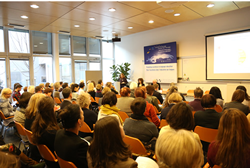 The ECML colloquium "Ensuring quality in language testing and assessment" (Graz, Austria, 7 December 2016) was a great success.
The ECML colloquium "Ensuring quality in language testing and assessment" (Graz, Austria, 7 December 2016) was a great success.
Thank you to everyone who contributed and participated - onsite and online!
You may now watch or review the debates here:
- Videos and presentations of all sessions
- Photos
07.10.2016
Towards a Common European Framework for Language Teachers: network meeting (Graz, 8-9 September 2016)
Following the successful launch of the project in January 2016, 27 experts were invited to participate in a two-day Network Meeting in Graz on 8th-9th September. The participants from 15 European countries included teachers, teacher educators and employers, as well as researchers working in different areas of language education.
The aim of the two-day meeting was to involve the participants as critical friends for the lifespan of the project, and to gain feedback on the work already done and new insights. There was intensive debate on what it means to be language teacher, revolving around such questions as:
- What competences and other attributes do teacher need to do their work, and how are these demonstrated in concrete situations, for example observed teaching?
- How can important underlying attitudes, such as openness towards plurality, be fostered?
- How might an inventory of such competences and attributes be shaped so that it is useful to a range of different stakeholders?
As part of the process, the participants discussed first drafts of the project outputs. These include an outline for a guide to existing frameworks and instruments for teachers. The participants were also encouraged to take part in the piloting and further development of some instruments, including the European Profiling Grid, the Swiss Profiles for language teacher competences, and the adaptation of the FREPA/MIRIADI frameworks for teachers.
A panel discussion with invited teacher educators and student teacher from the Graz area on their experiences of teacher education and professional development provided a lead-in the project’s key question: do we need a common European framework for language teachers? There was agreement in principle that there would be many practical advantages in such a framework. There are, however, several provisos: for example, it was agreed that, among its other characteristics, an eventual common framework must be accessible to different kinds of users, up-to-date in terms of content, and plurilingual in its focus. Crucially, it should offer support for teachers, not just telling by them what competences and other attributes they should ideally have, but also by offering guidance on the kinds of practical and professional development experiences they should seek to help them further grow as teachers.
On this basis, the project consortium is looking forward to present first drafts of the project work to a wider audience in 2017.
The project team
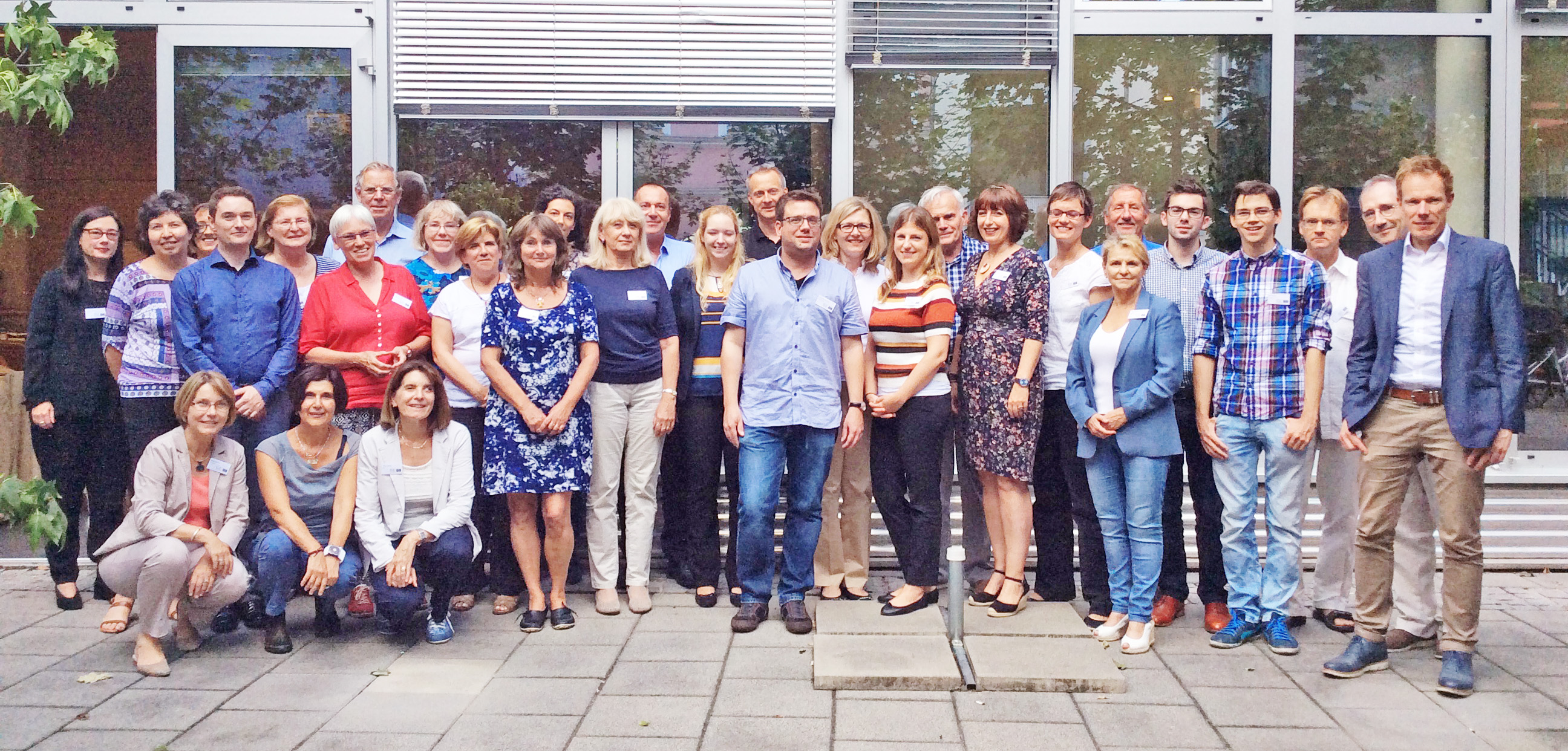
17.02.2016
Towards a Common European Framework for Language Teachers - project launch
‘Towards a CEFR for Language Teachers’ is a uniquely exciting project. It aims to explore the many various frameworks and other resources that describe the competences of teachers involved in language education, and to prepare a guide comparing the most relevant ones. There will also be reports on work to further develop the frameworks that we ourselves have worked on, and a study of the feasibility of a ‘framework of reference’ for teachers engaged in different forms of language education. This could contribute to the much-needed enrichment of teacher education and development as the role of languages in education increases in scope.
At our kick-off meeting in mid-January 2016 we made a good start on these aims. We began compiling a shortlist of 40 frameworks and other documents, and designed a procedure for analysing them. Then we can consult teacher educators and teachers on the scale and nature of the guide, which will feature case studies on the use of some of the tools. We also learned more about the five instruments members of the project group have contributed to: the PEPELINO portfolio, the EPG, the Eaquals Framework, the Framework of reference for pluralistic approaches to Languages and Cultures (FREPA), and the Swiss Profiles for profession-specific language competences, and their possible future development.
First drafts of this work will be ready by late summer 2016 so that we can gather feedback from experts and practitioners at our network meeting in early September.